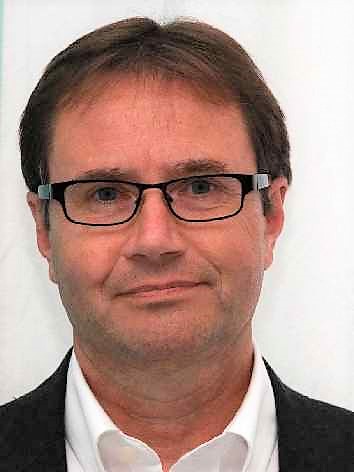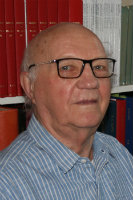W. John Armitage named Officer of the British Empire (OBE)
 Prof. W. John Armitage has recently been awarded an OBE for services to corneal transplantation in the Queen's New Year Honours list.
Prof. W. John Armitage has recently been awarded an OBE for services to corneal transplantation in the Queen's New Year Honours list.
John is the Head of Research and Development for Ocular Tissue, NHS Blood and Transplant, Emeritus Professor, Bristol Medical School, University of Bristol, and former Director of Bristol Tissue Bank, which comprised the Bristol Eye Bank and Bristol Heart Valve Bank.
John completed his PhD in cardiac cryopreservation and research posts in Cambridge, UK and Oak Ridge National Laboratory, USA, before joining the Department of Opthamology in Bristol, UK, where he set up the Bristol Eye Bank to carry out research into corneal preservation.
The Bristol Eye Bank, one of the largest eye banks in Europe, is home to the UK's Corneal Transplant Service (CTS), which provides corneas to hospitals across the UK. Since 1986 the CTS has provided corneal transplants for over 70,000 patients through the UK's National Health Service (NHS). Although funded by the NHS, management of the eye bank remained at Bristol until 2015, at which time it was transferred to the National Health Service Blood and Transplant (NHSBT), the public body overseeing all blood, organ, and tissue transplants in the UK.
One of the major breakthroughs of the CTS was the introduction of 34°C (93°F) organ culture storage, which extended the life of transplants from a few days, to approximately four weeks. This transformed the face of corneal transplantation in the UK by improving logistics and supply, allowing transplants to be scheduled weeks in advance, as opposed to emergency surgery.
Speaking of his award, John said, "I am delighted to have my work recognised in this way, which also reflects the significant impact of the work of the Bristol Eye Bank and acknowledges the collective effort of NHS Blood and Transplant (NHSBT) and Bristol University staff, ophthalmology colleagues in Bristol Eye Hospital and hospitals throughout the UK, and the support of the Royal College of Ophthalmologists. However, above all, it is the thoughtfulness and generosity of the families of eye donors, without whom corneal transplantation would not be possible, that truly merit the thanks of patients and their doctors."
John is the current President of the European Eye Bank Association, of which he was a founding member, Associate Editor of Cryobiology, and a long time member and former Governor of the Society for Cryobiology.

 Although a standard practice in many European countries, a medical team in Hong Kong used the Organ Care System for the first time on a human heart transplant. Invented in the USA, the Organ Care System is superior to traditional ice boxes for transporting organs by keeping the heart warm and beating with oxygenated blood up to 10 hours. Dr Timmy Au Wing-kuk, chief of Queen Mary Hospital’s cardiothoracic surgery department where the medical procedure was performed, says the implementation of the Organ Care System can increase the number of successful transplants by 5 to 10 each year. This transport method also allows medical teams to use hearts that would have been disqualified previously due to donor's age, organ condition, or travel distance.
Although a standard practice in many European countries, a medical team in Hong Kong used the Organ Care System for the first time on a human heart transplant. Invented in the USA, the Organ Care System is superior to traditional ice boxes for transporting organs by keeping the heart warm and beating with oxygenated blood up to 10 hours. Dr Timmy Au Wing-kuk, chief of Queen Mary Hospital’s cardiothoracic surgery department where the medical procedure was performed, says the implementation of the Organ Care System can increase the number of successful transplants by 5 to 10 each year. This transport method also allows medical teams to use hearts that would have been disqualified previously due to donor's age, organ condition, or travel distance.  As my term as President of the Society for Cryobiology draws to a close, I would to express my deep appreciations and to reflect on the achievements of our society during the previous two years.
As my term as President of the Society for Cryobiology draws to a close, I would to express my deep appreciations and to reflect on the achievements of our society during the previous two years.  A recent hiking trip turned frigid after t
A recent hiking trip turned frigid after t
 A team of medics at the University
A team of medics at the University  CRYO2019 Plenary speakers Bart Panis and Oliver Ryder have featured in a recent news article by Katharine Gammon, a freelance science writer in California, who attended CRYO2019 as our guest. Ryder, the director of the "Frozen Zoo", presented on the continuous efforts made by the San Diego zoo to cryopreserve genetic material from over 10,000 species. Panis, a senior researcher with the Leuven, Bioversity International, discussed with Gammon the massive ice cave-turned-seed bank,
CRYO2019 Plenary speakers Bart Panis and Oliver Ryder have featured in a recent news article by Katharine Gammon, a freelance science writer in California, who attended CRYO2019 as our guest. Ryder, the director of the "Frozen Zoo", presented on the continuous efforts made by the San Diego zoo to cryopreserve genetic material from over 10,000 species. Panis, a senior researcher with the Leuven, Bioversity International, discussed with Gammon the massive ice cave-turned-seed bank,  Researchers from Massachusetts General Hospital and Harvard Medical School began supercooling rat livers 5 years ago with the intention of being able to preserve human organs for more than the current 9 hours. Society for Cryobiology members,
Researchers from Massachusetts General Hospital and Harvard Medical School began supercooling rat livers 5 years ago with the intention of being able to preserve human organs for more than the current 9 hours. Society for Cryobiology members,  It is with sadness we have to pass on news of the recent death of Prof. David
It is with sadness we have to pass on news of the recent death of Prof. David  The Society for Cryobiology is pleased to announce that we have employed a new administrator - Amelia Hanson. She has an education in chemical engineering and experience in the Houston oil & gas industry. A native Texan, Amelia now lives in New Zealand as a technical writer and website designer. Working directly with the society's Executive Director, Nicole Evans, Amelia assumed the position of administrator February 27th, 2019. You can contact her at
The Society for Cryobiology is pleased to announce that we have employed a new administrator - Amelia Hanson. She has an education in chemical engineering and experience in the Houston oil & gas industry. A native Texan, Amelia now lives in New Zealand as a technical writer and website designer. Working directly with the society's Executive Director, Nicole Evans, Amelia assumed the position of administrator February 27th, 2019. You can contact her at  Gayle Volk, a CRYO2019 Program Committee Track Co-Chair for Plant Cryobiotechnology, has recently been in the news about a study into heritage apple cultivars in Wyoming, USA. Samples from Heritage apples, planted in the 1800s, were collected from nearly a hundred farms, orchards, or homesteads and are being studied to determine existing traits that allow these trees to survive, even thrive, in the harsh, cold Wyoming climate.
Gayle Volk, a CRYO2019 Program Committee Track Co-Chair for Plant Cryobiotechnology, has recently been in the news about a study into heritage apple cultivars in Wyoming, USA. Samples from Heritage apples, planted in the 1800s, were collected from nearly a hundred farms, orchards, or homesteads and are being studied to determine existing traits that allow these trees to survive, even thrive, in the harsh, cold Wyoming climate.  University College London (UCL) and the Royal Free London Hospital have announced a new ovarian tissue bank to preserve the fertility of girls and women about to undergo treatment for cancer.
University College London (UCL) and the Royal Free London Hospital have announced a new ovarian tissue bank to preserve the fertility of girls and women about to undergo treatment for cancer.  Prof. W. John Armitage has recently been awarded an OBE for services to corneal transplantation in the Queen's New Year Honours list.
Prof. W. John Armitage has recently been awarded an OBE for services to corneal transplantation in the Queen's New Year Honours list. 

